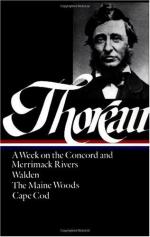|
This section contains 8,813 words (approx. 30 pages at 300 words per page) |

|
SOURCE: Wilson, Eric. “Thoreau, Thales, and the Distribution of Water.” The Concord Saunterer 6 (1998): 27‐41.
In the following essay, Wilson explores Thoreau's concept—borrowed from the philosopher Thales—of water as the fundamental principle of the cosmos.
On New Year's Day, 1851, Thoreau as usual set out on his afternoon walk, exhilarated by another warm day, the third in a row, surrounded, though the sky was sunless, by a luminous mist. He made his way to a deep cut in the bank around Walden Pond, his former habitat. There he beheld thawing clay, the frozen earth melting under the plastic power of midwinter spring: earth returning to first water. Metamorphosing his head to hands and feet, Thoreau dug below the surface of the sliding mud, unearthing its subterranean significance:
These things suggest—that there is motion in the earth as well as on the surface; it lives & grows. It is warmed...
|
This section contains 8,813 words (approx. 30 pages at 300 words per page) |

|


